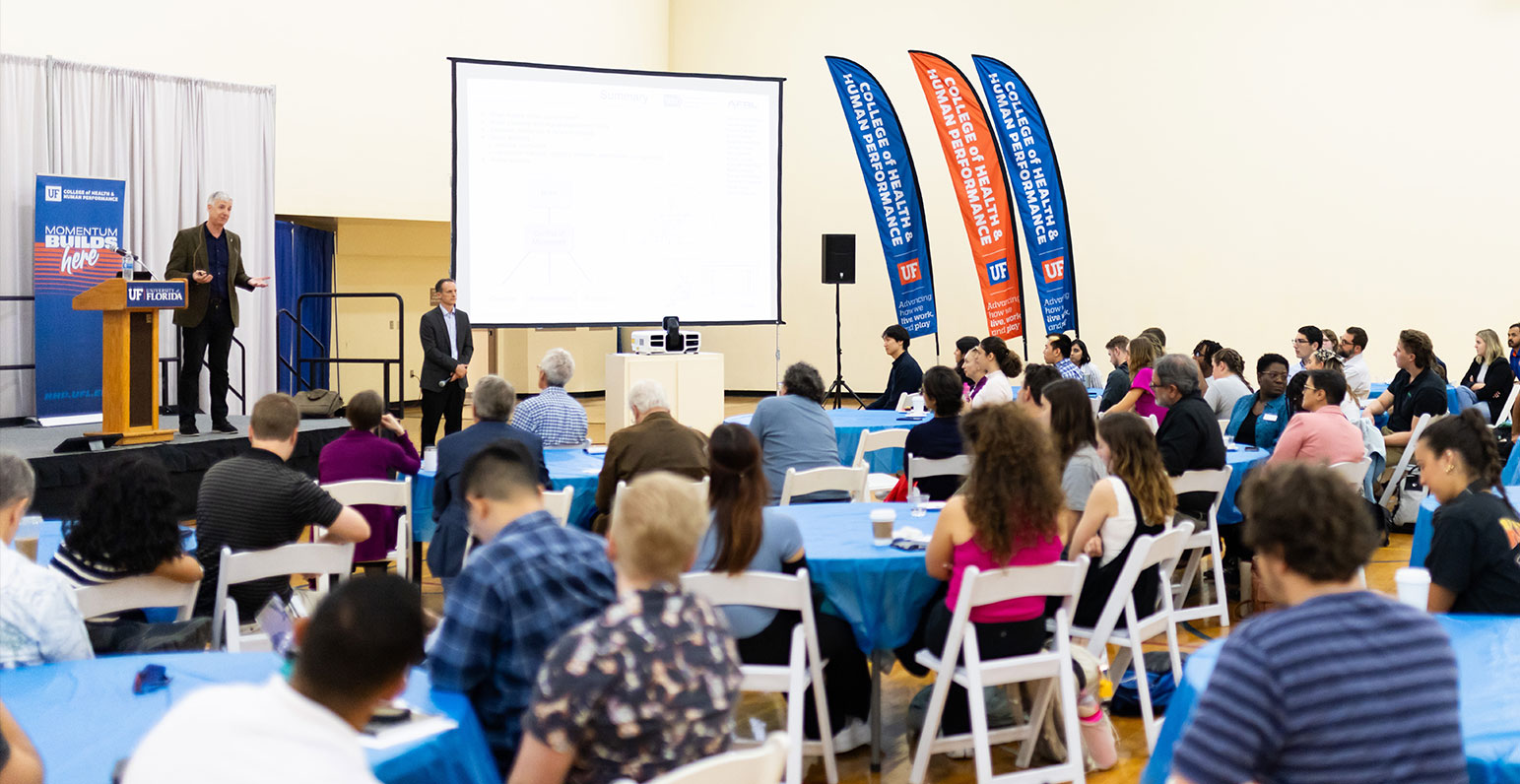 HHP - Update me in site_config > General Configuration
HHP - Update me in site_config > General Configuration
The 37th Annual D.K. Stanley Day Celebrated the First Dean and the College's Commitment to Enhancing the Quality of Life

Daniel M. Wolpert, Ph.D., shares his research at D.K. Stanley Day in the Florida Gym on March 26, 2024. Photo by Morgan Waters. View more photos >
April 10, 2024
The 2024 D.K. Stanley Day Committee and the College of Health & Human Performance welcomed the university and greater community to a special lecture and research symposium on Tuesday, March 26 in celebration of our first dean and the college's commitment to enhancing the quality of life.
The day began with the lecture, “What’s a brain for: A moving story," from Daniel M. Wolpert, Ph.D., professor of neuroscience and principal investigator at the Zuckerman Institute, Columbia University. Dr. Wolpert shared his research focusing on the fundamental question: Why do we and other animals have brains?
Wolpert emphasized that the primary purpose of our brains is to produce adaptable and complex movements. He argued that action, rather than mere perception or cognition, is the driving force behind brain function. He highlighted the importance of movement in communication, expression and interaction with the world.
Despite the significance of movement, understanding how the brain controls it remains a challenge. Wolpert compared human motor skills to playing chess, noting that while computers excel at strategic thinking, they still struggle with tasks requiring dexterity and adaptability.
The lecture delved into various aspects of motor control, including motor planning, sensory feedback and motor learning. Wolpert introduced concepts such as optimal feedback control, Bayesian inference and forward models, which are theoretical frameworks for understanding how the brain optimizes movement in the face of uncertainty and noise.
He discussed the role of sensory feedback in refining movements and highlighted the brain's predictive abilities in anticipating the consequences of actions. He also touched upon the importance of prior knowledge and learning in motor control, showcasing innovative robotic interfaces used in research to study motor learning.
Overall, Wolpert's lecture provided an exploration of the brain's role in producing movement and offered insights into ongoing research efforts to unravel the complexities of motor control.
The lecture was recorded and is available to watch online.
A research symposium followed the lecture with more than 80 students participating. Winning posters were chosen by reviewers representing respective departments, who assessed submissions based on scores and provided feedback. Monetary prizes, ranging from $125 to $400, were awarded to the top-performing entries. The symposium provided a platform for students to showcase their research findings and engage with peers and faculty members.
Student Research Symposium - Winning Posters
Joelle Simpson. The effect of aging on gait in autistic individuals across a lifespan. (Dr. Zheng Wang)
Trace Thome. A tryptophan-derived uremic metabolite-Ahr-Pdk4 axis promotes skeletal muscle mitochondriopathy in chronic kidney disease. (Dr. Terence Ryan)
Yangyi Luo. Contribution of Contribution of Insulin-Like Growth Factor-I secreted from Fibro-Adipogenic Progenitors to Skeletal Muscle Regeneration and Cellular Behaviors. (Dr. Elisabeth Barton)
Elena Kalina. Assessing Within-Person Behavioral Reactivity to an Ecological Momentary Assessment Protocol Measuring Protective Behavioral Strategies. (Dr. Nichole Scaglion)
Maribel Rodriguez Perez. Behavioral Economic Interactions Between Cannabis and Delta-8: Pilot Data. (Dr. Meredith Berry)
Lydia Yun. Effects of Perceived Corporate Partner’s CSR Motives on Participants’ Perceived CSR Authenticity: Moderating Role of Martyrdom Effect and Perceiving Calling. (Dr. Yong Jae Ko)
Shu-Hao Chang. Sport Fans’ Emotional Responses toward Game Outcomes in the 2023 MLB Postseason: Natural Language Processing Approach. (Dr. Yong Jae Ko)
Tingjun Chen. Examining the Influence of Online UGC Sources on Tourists’ Satisfaction in the Context of a Chinese Destination. (Dr. Svetlana Stepchenkova)
Jiwoo Jung. Assessing Equity in Public Beach Access with Spatial Intersectionality. (Dr. Jinwon Kim)
Suzzlie Desir (HEB). Perceived Intentionality in Social Undermining of Weight Management Among Young Adult African American Women. (Dr. Megan McVay)
Eric Kunz (APK). Pre-Emptive Systemic Heat Therapy Attenuates Access-Related Limb Dysfunction in a Murine Model of Arteriovenous Fistula. (Dr. Terence Ryan)
Stay tuned for details about D.K. Stanley Day 2025. Visit hhp.ufl.edu/events.
--
Comment / Like / Share - Connect with #UFHHP
FACEBOOK │ INSTAGRAM │ LINKEDIN │ TWITTER
--